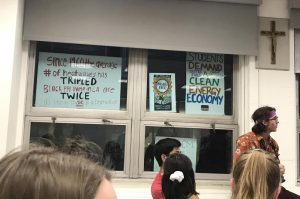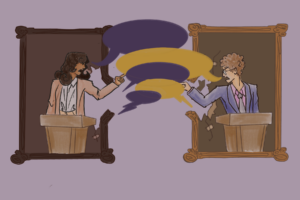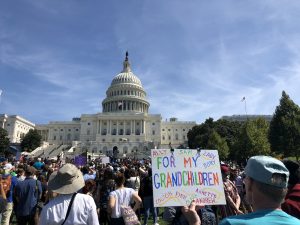Georgetown College Democrats (GUCD) and College Republicans (GUCR) sparred in their annual debate, moderated by the Georgetown Bipartisan Coalition on Oct. 25.
Three members represented each club. Asher Maxwell (CAS ’26), Elena Martinez (SFS ’25), and Brandon Wu (SFS ’24) spoke for GUCD, while Greg Brew (CAS ’24), Raed Asad (SFS-Q ’25), and Dalva Raposo (CAS-Q ’24) spoke for GUCR. The six delved into a variety of issues including income inequality, military aid for Israel, and affirmative action.
“We are very large proponents of Georgetown’s free speech and expression policy,” Michaela Cornejo (CAS ’25), president of the Georgetown Bipartisan Coalition, said before the debate. “[The debaters] are demonstrating a lot of courage to come up here and speak to all of you.”
Participants discussed three topic areas: the economy, foreign policy, and domestic social policy, with one debater from each side speaking for each. Maxwell and Brew began by discussing the economy based on questions about the role of unions, the trade deficit with China, and others. Lukas Pitman (SFS ’27), one of the moderators, first asked about the role of the government in addressing income inequality.
“The Republican message is the message of why people like my grandmother came to this country,” Brew said. He explained that she immigrated to America from Italy following the destruction of World War II.
“The reality is, she saved her money. She worked hard, and she was able to be successful,” he said. “We need more programs to encourage people to pull themselves up by the bootstraps, and that encourages jobs, lower taxes, lower corporate taxes especially. The government has to get out of our lives.”
In his rebuttal, Maxwell argued for a more active government role in combating income inequality.
“I presume that [your grandmother’s story] happens before the ’70s when the government was actually playing a helpful role in the economy,” Maxwell said.
“That story that you’re talking about really is not common in the American economy today. Because when we leave people to pull themselves up by their bootstraps, it makes that impossible,” Maxwell continued. “We just allow people who are already wealthy to continue to hold their wealth and not invest that in the American worker.”
Maxwell and Brew also discussed the impact of unions on productivity and worker safety. Maxwell cited dangerous work conditions in southern Amazon warehouses. “They have workers dying on the job and they’re told to just ignore their dead bodies and keep working,” he said.
“I think we’re being a little dystopian when you’re talking about people dying on the job—this isn’t 1900. The reality is productivity has increased with the decline in unionizing. No one’s dying on the job. We have work laws that are applied whether or not we have unions,” Brew said.
In the audience Q&A session at the end of the debate, one audience member spoke about their brother, who died at work in 2021, and asked what the government’s role should be in ensuring worker safety. Brew said he felt the government should punish corporations that malpractice with high financial penalties.
Maxwell again pushed for greater government involvement. “The government should get in there and intervene and ensure that businesses are actually taking care of their workers and creating safe working conditions that uplifts and respects the dignity of every American worker,” Maxwell said.
During the second segment of the debate, Martinez and Asad debated foreign policy. Moderator Lucia Valderrabano (CAS ’26) began by asking the pair about American military aid to Israel.
Martinez agreed that the US should provide aid to Israel to fulfill its role as a strategic partner, but felt that the proportionality was getting concerning considering the humanitarian situation. “I believe that the most crucial thing the United States can do now is leading the charge on ensuring civilian casualties on both sides are reduced and that military aid is being used responsibly,” Martinez said.
Asad criticized Democratic politicians as being noncommittal on foreign policy issues in recent years and said that they should take a stronger stance on providing aid to Israel. “What’s important for America to do for foreign interests is to ensure Israel’s right to defend itself, and also make sure that the leadership of Palestine is in fact competent because you cannot support the Palestinians with the current leadership in Gaza and the West Bank,” Asad said.
In the final segment of the debate, Victoria Davis (CAS ’25) moderated Wu and Raposo’s discussion of domestic social policy, beginning with questions on public education and border policies. During the last question, which was, arguably, the most heated part of the debate, Wu and Raposo were asked about the Supreme Court decision overturning affirmative action that had inspired GUCD to author a petition to end legacy admission at Georgetown.
“College admissions should not be about your race, your gender, your sex, or whatever you may think is your identity. College admissions should be about your SAT scores, your transcripts, your essays, and who you are as a person,” Raposo, who is Black, said. “Why can’t I just feel like I got here on my own efforts? [Affirmative action] is detrimental to Black people because they have to be wondering every day if people think they deserve to be here.”
“Democrats fight for equity, where we say that if you are an underserved population and your population has been discriminated against by the government, we will help you make sure that you have access to equal opportunity,” Wu said. “Merit-based admissions is not real. The fact that we have legacy admissions at Georgetown demonstrates this.”
After the event, members from both GUCD and GUCR agreed on the importance of discussion and debate. Raposo reflected on American culture around free speech and discussion as an international student from Africa studying abroad from Georgetown’s Qatar campus.
“This is such an important American tradition that I didn’t have growing up,” Raposo said in an interview with the Voice. “I grew up in communist Africa, and in my country, you have no freedom of speech. I grew up being told that I should shut up as a woman—and just as anyone—in my country.”
“Coming here to America taught me how to think for myself and be able to express my ideas. The most beautiful thing that America was able to give me is this freedom,” she said.
Note: Brandon Wu is a staff writer with the Voice.






